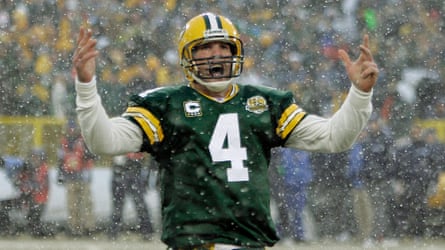Brett Favre was the man with the golden arm – a three-time NFL MVP who revived the Green Bay Packers while setting the league record for consecutive starts and all-time yardage, raising the standard for toughness and productivity at quarterback. It’s his thumbs that let him down in the end. He could play through the thumb injuries – but allegedly not the urge to send lewd text messages to a staff member at the New York Jets, or the digital impulses that would tie him to allegations over a $94m welfare scandal in his home state of Mississippi.
“Are people in these positions above the law?” Rebecca Gitlitz wonders. “Have they been told so many times that whatever they do they can get away with it? Stuff like that, where history repeats itself, I wanted to see how that happens.”
Gitlitz is the director of The Fall of Favre, the latest in Netflix’s series of sports documentaries, Untold. The episode retraces the good-time gunslinger’s arc from humble Mississippi beginnings to his NFL peak to the texting scandal that tarnished his reputation. Suffice to say: this is not one of those NFL Films-grade hagiographies that covers Favre in glory, or paints him as a God-fearing daddy’s boy with the Dixie drawl who was firmly at his wife’s side for her much-publicized cancer fight. Nor does it linger on his retirement fickleness or his debatable influence on former understudy Aaron Rodgers, the NFL’s current drama king gunslinger.
Absent are the typically effusive witnesses to the Favre mythos such as Mike Holmgren, the coach who won a Super Bowl with Favre in Green Bay. Instead, there’s Ron Wolf, the Packers GM who landed Favre in a landmark trade with Atlanta in 1992. (The Falcons buried Favre on the depth chart after drafting him in the second round in 1991.) Tellingly, Wolf characterizes Favre as his greatest scouting find, but is so solemn while reflecting on that career achievement that you can’t help wondering if some part of him regrets his role in creating what Favre would become.
Peter King, the retired Sports Illustrated football writer who was achingly close to Favre in his heyday, also appears in the film and seems genuinely disappointed by the quarterback’s legacy. The Green Bay Area journalists who saw the more unsavory sides of Favre on a regular basis, however, are more cynical. “There’s no [Packers] team owner, no one to answer to,” Gitlitz says of Favre’s entitlement in Green Bay. “There’s small town media. What the Packers experience did for him as a person is a seminal piece of this storytelling.”
A striking appearance in the documentary is made by another NFL star quarterback, Michael Vick. Both men are flawed – Vick, who is Black, went to prison for his part in a dogfighting ring – but the difference in the way America reacted to their respective rise and falls says a lot about who is forgiven in the United States.
But the star interview is Jenn Sterger, the Jets presenter who claims the team let her go after Favre – a splashy free-agent acquisition approaching the end of his career – allegedly sent her a flurry of unsolicited text messages, including a few that purported to show his penis. (Favre was found not to be in violation of the NFL’s personal conduct policy, but fined $50,000 anyway for not cooperating with the league’s investigation.) Shockingly, Sterger reveals in the doc that she has never met Favre. “If that single statement was alarming to me, I felt like there’s got to be an awful lot here,” Gitlitz says. “So we went digging, and it was plentiful.”
The director is at pains to cast Sterger as collateral damage in the Favre legend. Though she first rose to fame for wearing skimpy clothes to college games, Sterger, who bears a striking resemblance to Favre’s wife, describes herself as an awkward theater nerd who had aspired to a career as a sideline reporter. (Hauntingly, her role model was Erin Andrews, the veteran sportscaster who was covertly videotaped in her hotel room.)
Sterger says her connection to Favre likely would have never come to light if she hadn’t made offhandedly mentioned the text allegations to former Deadspin editor AJ Daulerio years later. Daulerio, a dubious figure in his own right, swiftly betrayed her confidence for what turned out to be the scoop of the year. Sterger believes someone in the Jets front office passed Favre her number, and is convinced that’s a crime. But because this all went down in the early-2010s, well before #MeToo, Sterger was pilloried in the tabloids and traditional media as a jezebel who sought to bring down the NFL’s golden boy. She was effectively blackballed from the profession. In the doc, she says Favre “destroyed my life”.
Two Jets message therapists suing Favre for sexual harassment after the allegations of inappropriate messages to Sterger emerged didn’t much move the public. Tim Andre, the Jets intern supervisor inexplicably tapped to serve as Sterger’s bodyguard, spends much of the doc lamenting his inability to protect her. “I just felt like Jen deserved for her story to be told in an honest way,” Gitlitz says. “That was our goal for the film, to tell the honest story and let people decide for themselves how they want to feel about any one thing.”

Sterger might never have reemerged to address her chapter with Favre if it hadn’t been for a 2022 Mississippi welfare audit that alleged the quarterback had diverted $8m in funds to himself or to causes he championed – most notably the construction of a volleyball facility at the University of Southern Mississippi, where his daughter was playing at the time. (Favre also played college football there.) In one text message that was published by Mississippi Today, he asked former governor Phil Bryant “if you were to pay me is there anyway [sic] the media can find out where it came from and how much?” It’s worth highlighting that Mississippi is the poorest state in the US.
Although the welfare scandal wound up costing Favre lucrative endorsements, broadcast work and general credibility, he has never been charged with any wrongdoing over the allegations. What’s more, he has remained denied any wrongdoing throughout, suing anyone who would even suggest he had broken the law – not least the auditor who conducted the welfare investigation for the state of Mississippi. (Meanwhile, Bryant pressured Mississippi Today to reveal its sources in a defamation lawsuit that was ultimately dismissed.)
For Sterger though, the welfare scandal is a vindicating moment years in the making. “She said, ‘I told you all, and nobody listened to me,’” Gitlitz says. “She spent a lot of time talking to me about the people of Mississippi that had really suffered at the hands of the scandal. She felt like there were an awful lot of people who weren’t getting their stories told, and she felt solidarity with that.”
Favre declined an invitation to participate in the documentary and even wrote back himself to say no – a development that is both surprising and not given his feeble resistance to keyboards. “He said, ‘Why are you making this? If I wanted to make a documentary myself, I could have,’” Gitlitz says. But even Favre would have to concede her documentary isn’t an all-out character assassination. Notably, it skips the chapters on the quarterback’s substance addictions and close associations with Mark Chmura, Darren Sharper and other controversial characters. But those omissions don’t prevent the film from making the essential point: the Favre name still means something, whatever his troubles off the field.
Gitlitz’s film closes with a scene from Favre’s appearance at a congressional committee hearing on welfare reform – where he unexpectedly revealed that he had been diagnosed with Parkinson’s disease, dramatically shifting the focus from the fraud in Mississippi. One of the lawmakers on the dais nods at Favre’s gridiron greatness, and autograph seekers approach him afterward. It’s a perfect illustration of Favre’s inherent complexity, and why he endures as a classic protagonist. “It’s really fascinating how people mythologize their sports heroes,” Gitlitz says. “People tie these great memories to their sports heroes, and it’s so hard to disentangle the two.”
-
The Fall of Favre is available to stream now on Netflix

.png) 3 months ago
88
3 months ago
88

















































